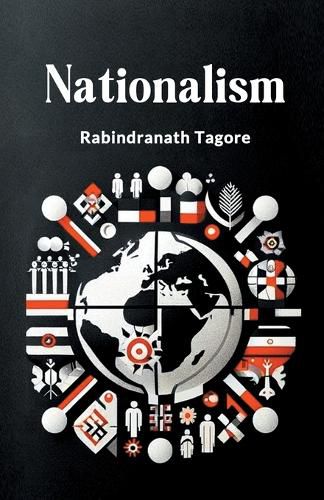Readings Newsletter
Become a Readings Member to make your shopping experience even easier.
Sign in or sign up for free!
You’re not far away from qualifying for FREE standard shipping within Australia
You’ve qualified for FREE standard shipping within Australia
The cart is loading…






This title is printed to order. This book may have been self-published. If so, we cannot guarantee the quality of the content. In the main most books will have gone through the editing process however some may not. We therefore suggest that you be aware of this before ordering this book. If in doubt check either the author or publisher’s details as we are unable to accept any returns unless they are faulty. Please contact us if you have any questions.
"Nationalism" is a collection of essays written by Rabindranath Tagore, the renowned Indian poet, philosopher, and Nobel laureate. The book, originally published in 1917, is a profound exploration of Tagore's thoughts on nationalism, patriotism, and the implications of these ideologies for India and the world. Tagore critiques the narrowness and divisiveness of nationalist fervor, advocating instead for a more universalistic worldview. He argues that true freedom and progress can only be achieved through a broader sense of human unity, transcending narrow national boundaries. Spiritual and Cultural Renewal: Tagore emphasizes the importance of cultural and spiritual renewal as essential components of a nation's progress. He calls for a renaissance that revitalizes the spiritual and artistic heritage of India, rather than simply imitating Western models of nationalism. Critique of Western Imperialism: Tagore's essays also critique Western imperialism and its impact on global politics and culture. He argues against the imposition of Western ideas and values on non-Western societies, advocating for cultural autonomy and self-determination. Rabindranath Tagore's literary works, including "Nationalism," have had a profound impact on Indian literature and cultural discourse. His ideas continue to inspire scholars, activists, and policymakers worldwide. "Nationalism" by Rabindranath Tagore is a seminal work that challenges conventional notions of nationalism while advocating for a more inclusive and humanistic approach to societal development. Tagore's critique of narrow nationalism and his vision of a culturally vibrant and spiritually enriched India have left an enduring legacy, influencing generations of thinkers and leaders both in India and globally. His writings continue to offer valuable insights into the complexities of identity, cultural autonomy, and the quest for universal harmony in a diverse world.
$9.00 standard shipping within Australia
FREE standard shipping within Australia for orders over $100.00
Express & International shipping calculated at checkout
This title is printed to order. This book may have been self-published. If so, we cannot guarantee the quality of the content. In the main most books will have gone through the editing process however some may not. We therefore suggest that you be aware of this before ordering this book. If in doubt check either the author or publisher’s details as we are unable to accept any returns unless they are faulty. Please contact us if you have any questions.
"Nationalism" is a collection of essays written by Rabindranath Tagore, the renowned Indian poet, philosopher, and Nobel laureate. The book, originally published in 1917, is a profound exploration of Tagore's thoughts on nationalism, patriotism, and the implications of these ideologies for India and the world. Tagore critiques the narrowness and divisiveness of nationalist fervor, advocating instead for a more universalistic worldview. He argues that true freedom and progress can only be achieved through a broader sense of human unity, transcending narrow national boundaries. Spiritual and Cultural Renewal: Tagore emphasizes the importance of cultural and spiritual renewal as essential components of a nation's progress. He calls for a renaissance that revitalizes the spiritual and artistic heritage of India, rather than simply imitating Western models of nationalism. Critique of Western Imperialism: Tagore's essays also critique Western imperialism and its impact on global politics and culture. He argues against the imposition of Western ideas and values on non-Western societies, advocating for cultural autonomy and self-determination. Rabindranath Tagore's literary works, including "Nationalism," have had a profound impact on Indian literature and cultural discourse. His ideas continue to inspire scholars, activists, and policymakers worldwide. "Nationalism" by Rabindranath Tagore is a seminal work that challenges conventional notions of nationalism while advocating for a more inclusive and humanistic approach to societal development. Tagore's critique of narrow nationalism and his vision of a culturally vibrant and spiritually enriched India have left an enduring legacy, influencing generations of thinkers and leaders both in India and globally. His writings continue to offer valuable insights into the complexities of identity, cultural autonomy, and the quest for universal harmony in a diverse world.